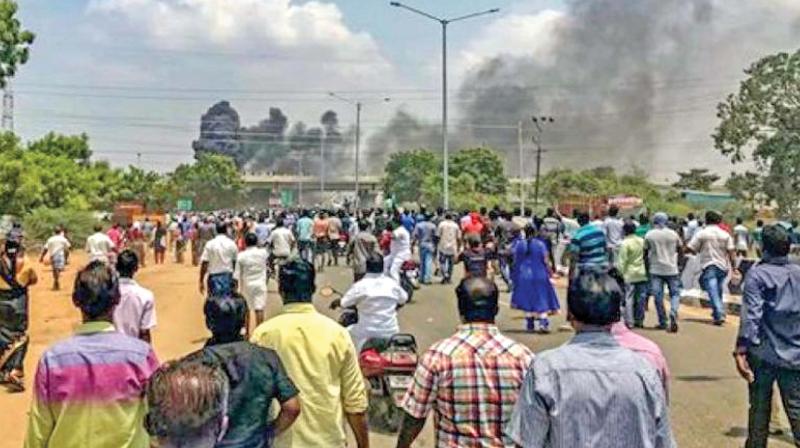Tamil Nadu: Industry, scientific community unhappy with closure order
Actually, it's 'bad' for the country in many ways, say experts, while placing multiple reasons and factors to support their concerns.

Chennai: “Knee-jerk reaction to mob action mishandled by the police”. That seems to be the general reaction from the industry and scientific community to the Tamil Nadu Government order closing down the Sterlite copper smelter unit in Thoothukudi 'for good'.
Actually, it's 'bad' for the country in many ways, say experts, while placing multiple reasons and factors to support their concerns. One of those fears is that from being a copper-exporter, India could dip to be an importer of the metal that is getting dearer globally in terms of availability and cost. And copper is also becoming more and more important for the manufacturing industry-particularly the electrical, transport and refrigeration sectors. Demand for copper can only go up further as the transportation industry globally is moving towards electric-powered vehicles to cut down on fossil fuel and on toxic emissions.
Vedanta's Sterlite and Aditya Birla Group's Hindalco are the two main producers of copper in India. With Sterlite's closure, the demand load on Hindalco is bound to increase with a cascading price shoot up, as was seen when Sterlite suffered closure for some months due to high court order in 2013 following a gas leak. However, the Supreme Court allowed Sterlite to reopen while observing that the plant “contributes substantially to the copper production in India and copper is used in defence, electricity, automobile, construction and infrastructure etc.” The court also noted that the plant “has about 1,300 employees and it also provides employment to large number of people through contractors”.
Industry sources, however, said the Rs 2,500 crore plant, with annual capacity of four lakh tonnes, actually employs about 3,500 people directly besides providing indirect employment to over 25,000.
The present problem erupted three months ago after Sterlite sought to double its capacity to eight lakh tonnes (annum) at a cost of Rs 3,000 crore. Locals were soon joined in the agitation by global NGOs and other players, besides of course the political class, and the 100th day rally on May 22 turned bloody with 13 protesters dying in police firing.
Needless to say the AIADMK government came under intense pressure from the rights groups but more painfully, hard criticism by the opposition parties. Some demanded CBI probe into the firing, DMK's Stalin wanted Chief Minister K. Palaniswami to resign.
While the ground reports, gathered from reliable eyewitnesses, insist that the anti-Sterlite protest for 99 days till that fateful Tuesday had been peaceful, with even women and children from the Thoothukudi families participating, the march towards the Collectorate on that 100th day morning was 'taken over' by hardliners from outside infiltrating.
This is precisely what the State Government, as well as the Union Minister Pon Radhakrishnan said; so did actor Rajinikanth, for which he got mouthfuls from the Dravidian politicos and left activists. The critics who slammed the CM, Ponnaar and the superstar have conveniently missed the point that the charge that 'anti-socials' had caused the havoc leading to the police firing was aimed at only the 'infiltrators' from outside, and to the protesting Thoothukudians.
The government ordered inquiry into the violence and police firing by retired high court judge, which is fine, but then, in typical knee-jerk response to the opposition outcry and the shock of the police firing casualties, it also ordered 'permanent' closure of the copper smelter unit.
While the government insisted that legal experts were consulted before the unit was shut down, not many in the know of things would agree. DMK leader Stalin himself was convinced that such closure order would not stand the test of law and must be backed by Cabinet decision and Assembly resolution. Others not so politically tuned, have stronger and more sober reasons to slam the State's closure order.
“You cannot, just like that, order closure of an industrial unit in which thousands of crores have been invested and thousands of people are employed, and on whose production so much of national interests depend; and that too, after letting it run all these years. There should have been a notice to the company, time given for explanation, time given for reparation of any pollution issues. You cannot order closure just like that. That's against law of natural justice”, said a former senior state bureaucrat, requesting anonymity.
Amid all this, one very sensible suggestion came from the Federation of Indian Chambers of Commerce and Industry (FICCI), which appealed to the government to reconsider the Sterlite closure and move away from populist measures that do not bring about any sustainable long-term results. With the rumours of pollution floating around and sentiments wounded, the government must now constitute an independent expert committee “to gauge the pollution and advise necessary remedial actions to be immediately taken-ways and means to be found to eliminate any pollution or threat to life that may be present”, said TN state council chairman Ar Rm Arun.

